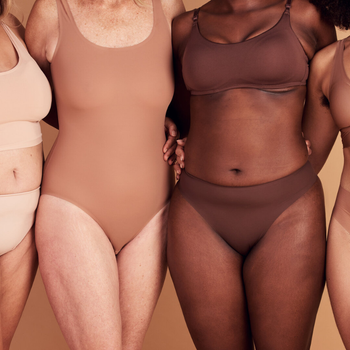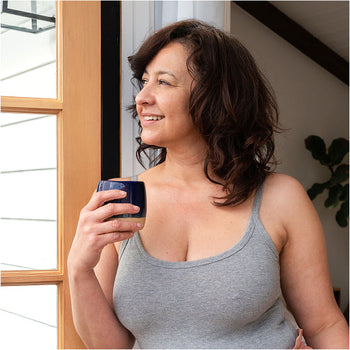Couch Conversations are a space for us to listen to one another and talk passionately and personally about shared experiences we have historically been encouraged NOT to share. So many people on their menopause journey feel isolated. While the outside world may not appreciate what’s happening in these sacred connections, inside a group of us are getting ready to take action.
Hosted by Kindra CEO, Catherine Balsam-Schwaber and award-winning journalist Gayle King, the inaugural Couch Conversation took place in Gloria Steinem’s Upper East Side living room. The space was full of women including actresses, CEO’s, OB-GYNs, writers, a venture capitalist, and the iconic activist herself, each with their own journeys in life, but one thing was certain – the language around menopause had to change.
As the saying goes, “Everything is politics.” The intimate conversation didn’t stick to an agenda, it was an open space for the women to share, discuss, ask questions, and probe at why menopause remains a stigmatized, taboo, and underrepresented discussion, despite that it’s something half the population will go through during their lifetime.
The group gathered side-by-side in the living room and Gayle opened with the essential question: Why is menopause shameful? Then came a bit of wisdom from Gloria Steinem who’s ability to contextualize women’s issues in our political landscape remains unparalleled: “Well, I'll answer, but I'm not sure that this is any answer except mine, which is that we’re valued mainly for childbirth. We have the one thing that guys don't have, which is wombs.”
“It’s awful to hear ‘dried up,’” says someone from across the coffee table.
“Our wombs are identity in patriarchal culture.” continues Steinem.
“Do you think it’s because it’s associated with childbirth, so you’re no longer valued?” asks another woman.
“I think so. Of course, there are cultures who are wiser and value wisdom, therefore, more experience. But what we’ve experienced is probably not that, mostly,” says Steinem setting the tone for about an hour of thoughtful conversation surrounding women, menopause, politics and more.
The women on the couches and chairs nod in agreement about the notion that our culture is not one that celebrates women for their wisdom as we age. It’s time to change that. Starting with conversations like this one. Menopause should be the beginning of being celebrated not “the end.”
“Talking among women is really important to be able to break down this stereotype that this is meant to happen in isolation,” says Catherine Balsam-Schwaber. “Everyone has an individual experience, which is part of why it’s so challenging - there are 34 or 48 changes that could be happening in your body at the same time. For some women it’s heart palpitations and depression and for some women it’s hot flashes – and for pretty much every woman it’s vaginal dryness. And nobody wants to talk about that.”
The doctors in the room, Dr. Sharon Malone, one of the nation’s leading OB-GYNs, and Dr. Suzanne Gilberg-Lenz, Kindra Medical Advisor, shared a candid dialog. They acknowledge, much to the relief of women who have felt frustrated by misdiagnosis, judgmental information, and lack of conversation with their medical providers about menopause, that the modern medical system as failed women thus far.
Menopause provides complications for medical providers, the wide variety of experiences, and the stigma around the conversation, means it’s often not simple yes and no answers. The conversations need to start early, before the throes of menopause. The model of information needs to change, we know that one-on-one with medical providers isn’t providing the support system that women need. There need to be better ways to make women more aware of what their options are. “And there are options out there, a whole panoply of options, but if you don’t know what’s happening you don’t know what to talk about or what to ask about or what to look for,” says Dr. Sharon Malone.
There was conversation about how the menopause product market isn’t “niche” (6,000 women reach menopause each day), why women’s products are merchandised by the incontinence products in drug stores (let’s move them!), whether melatonin gummies help with sleep (disrupted sleep is a common symptom of menopause), and then the conversation turns towards hormone replacement therapy and additional options available for menopausal women.
“It’s important for people to know what’s important, what's safe, and what’s evidence based,” says Dr. Suzanne Gilberg-Lenz, “which is why I’m involved with Kindra who is doing the science and doing the work and providing alternatives.”
Embedding menopause in education is essential, the room agreed. It’s fundamental that education shouldn’t end with childbirth. Most women acknowledged they didn’t know what perimenopause was when it started for them. One step in ensuring the next generation doesn’t have this experience is to have these kinds of conversations at home, whether you have sons or daughters, so that they can enter the world as more informed and empathetic adults, who will be able to provide a support system.
There are more conversations yet to be had, this is just the beginning, but there were some takeaways that the group landed on in consensus: menopause shouldn’t conjure an image of a “dry vagina old woman,” it’s time to surface the power and the sex appeal and the wisdom of the evolving woman. A hot flash, a symptom of menopause that about four our of five women experience, can be reframed. Maybe, from now on it’s called a “power surge.”
“But what would lead to real change?” asked someone in the room. “This is an essential part of the process,” replied Gloria Steinem. “Every social justice movement in the world started with a conversation.”
Did You Know?
-
6,000 women in the U.S. reach menopause each day, yet most don't feel prepared for this change.
-
78% of women said that menopause interferes in their lives
-
1.1B women will be post-menopausal by 2025
Feeling Inspired? Take Action
Get involved to make a difference, to lend support, to educate, to inspire. Get involved to empower people who experience the hormonal changes of menopause to care for their bodies—naturally, safely, and holistically. Whatever your reason for getting involved with Couch Conversations, you can keep the conversation going. Email couchconcierge@ourkindra.com to receive an easy, informative guide on how to host a Couch Conversation and inspire change within your own circle.













